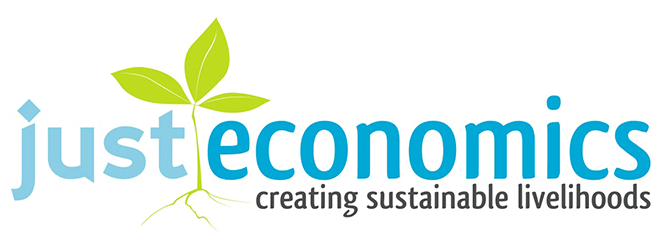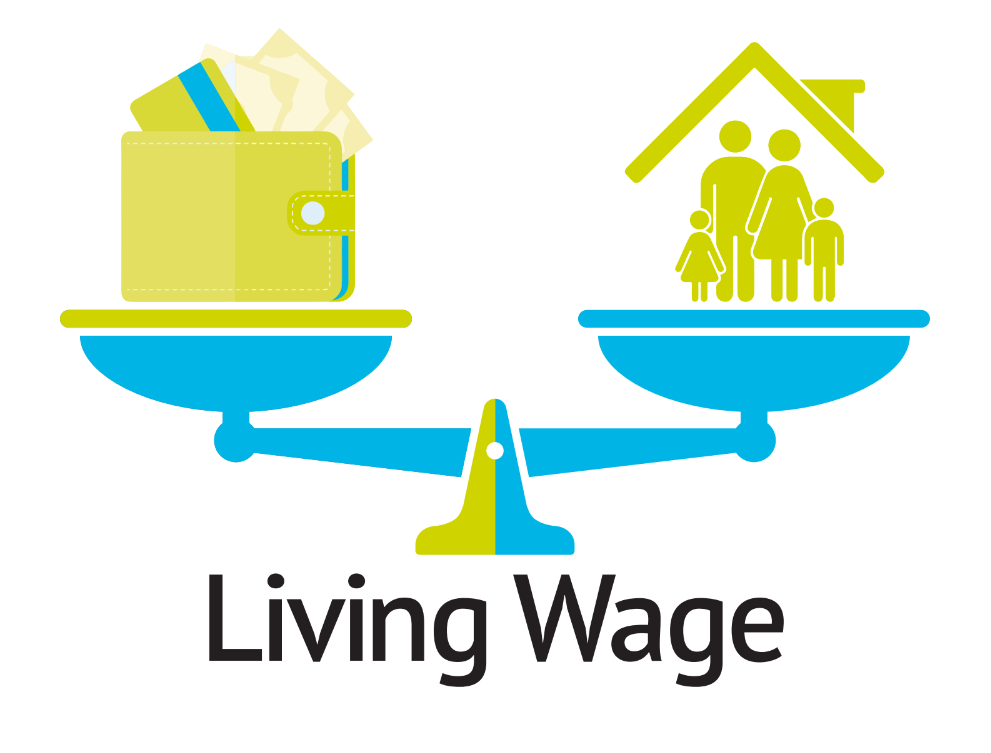Just Economics of WNC is announcing the 2024 Living Wage Rate for Buncombe County as well as the new starting rate for those certifying as Pledged Living Wage employers this year.
The 2024 Living Wage Rate is $22.10/hr, though employers previously certified have time to adjust to this rate and may still be compliant with our program as they work to make those adjustments. This rate represents the wage floor that would allow a single person working full-time to qualify for a 1BR apartment in the Buncombe County area. Just Economics uses a four-year rolling average of the Fair Market Rent (FMR) as determined by HUD to calculate this hourly wage used for Living Wage Certification.
Additionally, Just Economics is also excited to share the success and continuation of its new level of certification—Living Wage Pledged employers—launched in 2023. This year, these employers are paying a minimum wage rate of $19/hr and have committed to increasing their pay rate annually by 3% plus the annual rate of inflation. Living Wage Pledged certification is a recognition of both their current pay rate as well as their dedication to making annual pay increases until they reach the Living Wage rate.
This new two-tiered system aligns with the national program of Just Economics’ partner, Living Wage For US, a living wage certification program in the United States using an internationally recognized methodology. The entry-level wage certification is designed to highlight employers who have made a commitment to achieving the Living Wage Rate. The $19/hr starting rate for Living Wage Certified Pledged employers was calculated by Living Wage For US in consultation with both business and labor groups. It represents a starting point that is more attainable by some organizations, while still offering a reasonable pay for workers as they grow towards the Living Wage Rate.
Just Economics certifies employers in Western North Carolina using two different sets of wage criteria–one for Buncombe County and a separate wage rate for the rural counties in Western North Carolina. The 2024 Living Wage Rate for employers in rural counties outside of Buncombe County in Western North Carolina is $16.40/hr.
The Just Economics Living Wage Certification Program began in 2008. The model used for certification was based on the Tompkins County Workers Center in Ithaca, New York. Over the last fifteen years, the program has grown to include over 400 Western North Carolina employers, and is the largest such program in the nation, and Just Economics leads the national Living Wage Network.
FAQ:
What has changed with Just Economics’ Living Wage Certification Program in Buncombe County?
The 2024 Buncombe County Living Wage Rate is $22.10/hr (with or without benefits). This wage represents the lowest wage that will allow an employee working full-time to qualify for a one-bedroom apartment in Buncombe County, based on a four-year average of the Fair Market Rate released by HUD. The increase from the 2022 Living Wage Rate of $17.70/hr, to the 2023 rate of $20.10/hr, to the new 2024 rate of $22.10/hr reflects the significant increase in the cost of housing in our community.
In 2023, Just Economics also introduced a new path for employers who wish to become Living Wage Certified. This year, the program requires that an employer’s lowest paid employee earn at least $19/hr AND has a requirement that the employer pledged to increase their rate of pay every year by 3% plus the cost of inflation. For example, in 2023 the Pledged starting rate was $18/hr. Because the 2023 annual inflation rate was 3.1%, wages should be increased a total of 6.1% from $18 to $19.10/hr in 2024 to fulfill the pledge (Bureau of Labor Statistics, November 2023).
Employers pledging in 2024 can expect to know what their pledged increase should be for 2025 by November 2024 when the inflation report is released. The timeline for recertification with Just Economics has also shifted in recent years. This year and ongoing, the recertification process between Just Economics and employers begins in March at which point new wages and compliance with the program are assessed.
What has stayed the same?
The formula of our Living Wage Rate has remained tied to the cost of housing. We use the figures from HUD that report the Fair Market Rent for a one bedroom apartment rental in the Buncombe County area. We use a four-year rolling average of this number to adjust for dramatic changes and mitigate any spikes up or down. Our formula calculates the wage floor that would allow a single person working full time to qualify for a lease for a 1BR apartment in the Buncombe County area by making three times the rent, a common standard used by landlords to obtain housing.
We have always given time for employers to adjust to the new rate as we don’t expect wage increases to occur overnight. Please continue to the next question for elaboration on this.
My employer is Living Wage Certified, but I don’t get paid $22.10/hr. Are they out of compliance?
If your employer was certified in a previous year, they may still be paying the old living wage rate and still be compliant with the certification program. Businesses and organizations that certified in 2023 at the rate of $20.10/hr will not be recertified until 2025. Businesses that certified in 2022 are due for recertification in 2024, but do not have to submit an application verifying their new pay rates until the end of the recertification period. Any new employer seeking Leading Living Wage Certification must pay at least $22.10/hr.
Pledged Living Wage Employers who certified in 2023 at the rate of $18/hr with a commitment to raise their wages 3% + inflation (3.1% in 2023) are required to raise their wages to at least $19.10/hr to fulfill their 2023 pledge which will be verified by Just Economics this year and every year they remain pledged during the recertification period which begins in March.
Where did the $19/hr rate come from?
The Pledged rate of $19/hr was calculated by the national certification organization, Living Wage For US, a close partner of Just Economics. Their two-tiered system was the model which Just Economics closely replicated for its Pledged certification level introduced in 2023. This process has been vetted by national labor groups as a proven method of raising wages for workers as their employers work towards the Living Wage Rate.
Why are you certifying employers at a rate below your calculated Living Wage Rate?
This Pledged level of certification is a strategy Just Economics is using to support and promote businesses that are not yet ready to make the increases necessary to reach the Living Wage Rate of $22.10/hr. This is an acknowledgement that the cost of housing in Asheville has pushed the Living Wage Rate to increase faster than inflation and at levels that can be difficult for employers to keep up with, while encouraging participation in our program and pushing the wage floor higher for area employees. By tying this $19/hr wage requirement to a pledged annual increase in wages, Just Economics hopes to raise the pay rate for low wage workers and support these employers as they continue on the path to a living wage.
How are decisions about changes to the Living Wage Certification Program made at Just Economics?
Just Economics strongly values the input of our community when making changes to our programs. For decisions regarding our wage rate and formula we seek input from stakeholders, employees, employers, partner organizations, and the community at large. Decisions are made by our Board of Directors, and always with the Just Economics mission as the goal – a just and sustainable local economy that works for all in Western North Carolina.
What is driving the increase in the wage?
The cost of housing is driving the increase in wages. Anyone residing in Asheville or greater WNC has witnessed the extraordinary surge in the cost of housing over the last 5 years, a problem that is simultaneously occurring in communities across the nation. Because our formula exclusively factors the cost of housing, as housing costs increase or decrease, so will the Living Wage rate. Just Economics is disheartened by the extraordinary strain on workers to afford to live in the region and believes that while labor costs are a strain for businesses, a Living Wage must be rooted in the worker’s ability to afford to live in the region.
Many experts suggest that the cost of housing may be nearing its peak, or that at least increases will not occur as drastically as they have in the last period of five years. It is our hope that increases relax creating a more sustainable environment for workers and Living Wage Certified businesses.
Just Economics is working diligently to address this issue from both directions by working to increase wages to meet the costs faced by workers, and by addressing housing affordability and costs directly through policy advocacy, creation of the Centralized Rental Application, the launch of the Tenant’s Network, and as convener of the Affordable Housing Strategy Team.


